Long COVID
What is long COVID?
Long COVID is a condition that can develop after a COVID-19 infection. It includes many different symptoms, can impact every part of the body, and ranges from mild to severe. While most people with COVID-19 recover completely within a few weeks, some people develop long COVID and feel the effects for months or years.
A person’s long COVID symptoms can differ from their COVID-19 infection and might develop weeks after they first get sick. We don’t know why some people develop long COVID, but research is ongoing to better understand this condition. Long COVID symptoms can have a devastating impact on these individuals and their families. If you suspect that you, or someone you know, has long COVID, talk to a doctor or a healthcare provider to discuss persistent symptoms and possible treatment options.
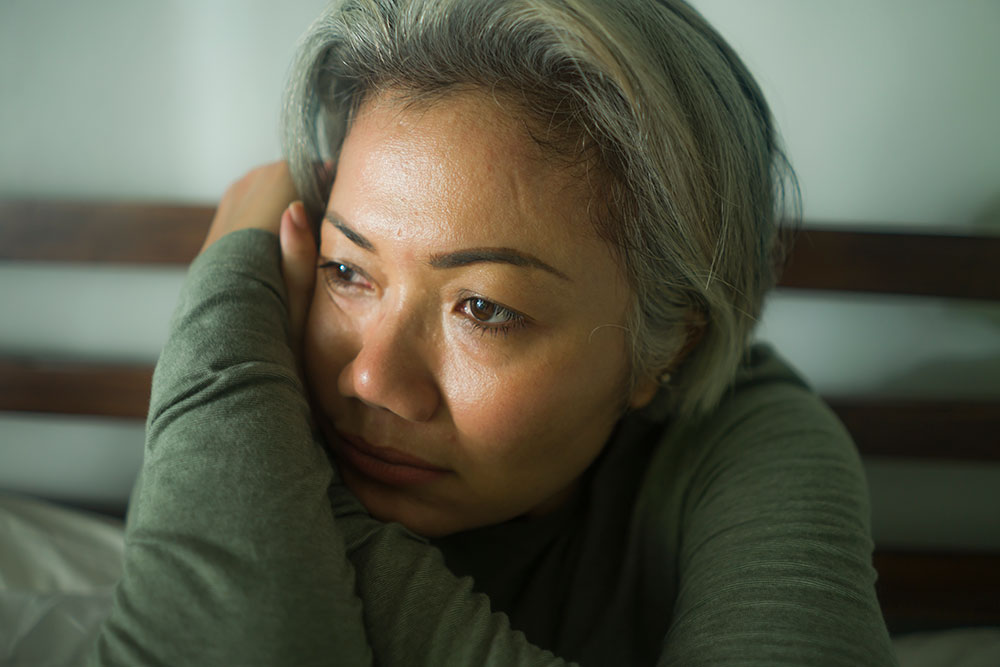
You may hear long COVID referred to by different names, such as long-haul COVID, chronic COVID, post-acute COVID-19, or post-acute sequelae of COVID-19 (PASC). According to the CDC, a person’s symptoms must last at least 4 weeks and must be present 3 months after a COVID-19 infection to be diagnosed with long COVID.
The CDC provides information on post-COVID conditions and what to expect.
What are some of the symptoms of long COVID?
People with long COVID can experience a wide range of symptoms. Some of the most common symptoms² are:
- Body aches
- Changes in menstrual cycles
- Cough
- Depression or anxiety
- Diarrhea
- Difficulty thinking or concentrating (brain fog)
- Dizziness when standing
- Fatigue
- Fast or pounding heart (heart palpitations)
- Fever
- Hair loss
- Headache
- Loss or change in taste or smell
- Shortness of breath or difficulty breathing
- Sleep problems
- Stomach Pain
- Symptoms that worsen after physical or mental activities (post-exertional malaise)
- Rash

These are not all the symptoms someone could have. People with long COVID could experience one or more symptoms. Over time, their symptoms may change in severity, or come and go. In more severe cases, long COVID symptoms like fatigue and brain fog limit a person’s ability to go to school or work, go about their daily activities, care for family, or engage with their community.
Some people with long COVID go on to develop other conditions. Long COVID associated conditions include chronic fatigue syndrome (ME/CFS), postural orthostatic tachycardia syndrome (POTS) which causes a person to feel faint and have a very fast heartbeat while standing up, and mast cell activation syndrome (MCAS) which causes a person to have severe allergic reactions.
Who can get long COVID?
In a recent survey, about 8% of all Utahns say they currently have long COVID and of those, nearly 1 in 4 report their activities are severely limited.
Anyone who had a COVID-19 infection can get long COVID, including children and otherwise healthy individuals, regardless of whether they had an asymptomatic, mild, moderate, or severe infection.
Still, research shows some people are more likely to develop long COVID including women, people with underlying health conditions, and people who did not get a COVID-19 vaccine. People who were hospitalized with the virus are also more likely to develop long COVID. Research shows your chance of having long COVID is lower if you are vaccinated.

How is long COVID diagnosed and treated?
Ongoing research will help us understand the impact of long COVID on the body and how to treat it. Currently, there are no tests for long COVID. Doctors can diagnose long COVID based on your medical history and a physical exam after ruling out other causes. Doctors may order blood tests, x-rays, or other tests to better understand the specific symptoms and confirm they’re not caused by other diseases.
There is no cure for long COVID. A healthcare professional or team can help make a plan to treat underlying causes and help manage symptoms. Depending on your symptoms, physical or occupational therapy can be helpful, or the guidance of medical specialists may be needed.
Local clinics with long COVID programs include:
Remember, the treatment that these clinics provide may or may not be covered by your health insurance. Ask your insurance company about potential costs prior to treatment so you know what to expect.

University of Utah COVID-19 Long Hauler Clinic
In person and telehealth options
(801) 213-0884
A referral is needed from a physician for these services. Call 801-213-0884 or fax the provider referral to: 801-213-1147.

Intermountain Pediatric Long COVID Navigation Clinic
In-person and telehealth options
801-662-1639 (main office)
A referral is needed from a physician for these services. Call 801-662-1610 or fax the provider referral to 801-297-1639.
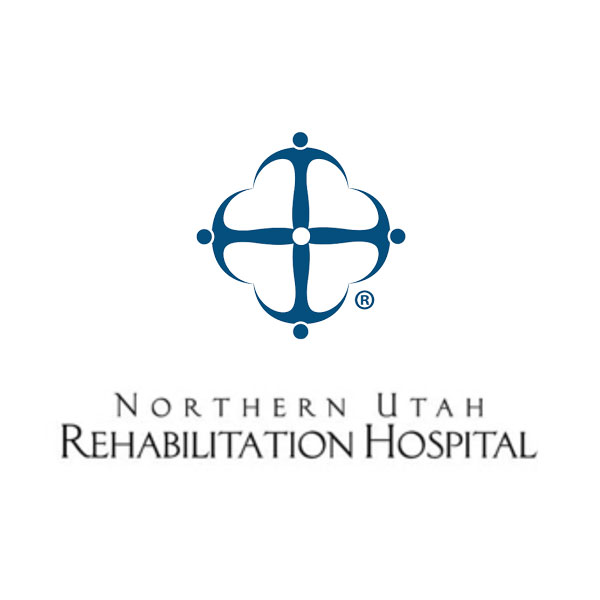
Northern Utah Rehabilitation Hospital
(801) 475-2102
A referral is needed from a physician for these services. Fax the provider referral to: (801) 475-2294.
Long COVID as a disability
Some people with long COVID have limitations in their daily activities that can pose significant challenges. If long COVID substantially limits one or more major life activities, then it can be classified as a disability under the Americans with Disabilities Act (ADA) guidelines. You can find official Guidance on “Long COVID” as a Disability Under the ADA from the U.S. Department of Health and Human Services. You can also find a list of frequently asked questions about long COVID as a disability from the U.S. Equal Employment Opportunity Commission by clicking this link.
Returning to work can be difficult for people who live with long COVID. The Utah Disability Law Center offers resources for people who request work accommodations including:
- A fact sheet with a written example of a reasonable accommodation request letter.
- Information and resources for working with a disability.
- Various levels of assistance with a variety of disability-related issues. Call (800) 662-9080 or use their online form at https://disabilitylawcenter.org/contact/.
- Webinars on reasonable accommodations at work.
The U.S. Department of Labor provides information to support people returning to work with long COVID and guidance for employers on workplace accommodations at https://www.dol.gov/agencies/odep/topics/coronavirus-covid-19-long-covid.
Some people with long COVID qualify for benefits like Medicaid or Social Security Disability Insurance. This checklist can help you prepare to apply. Applications can be submitted online at https://www.ssa.gov/benefits/disability/. There are agencies which can help you if you need assistance applying for these benefits or appealing a decision:
- Utah Department of Workforce Services assists the federal social security program in supporting people with disabilities who have very limited income. Visit https://jobs.utah.gov/usor/dds/index.html to learn more.
- Utah Legal Services offers free help to Utahns who meet income and residency qualifications. Find out if you qualify and apply for help at https://www.utahlegalservices.org/node/16/who-qualifies-get-help-utah-legal-services.
- Ability 1st Utah provides help if you are denied social security insurance or social security disability insurance. Ability 1st Utah can also help you apply for Medicaid and other public benefits or appeal help in Utah, Wasatch, Juab, and Sanpete counties. Call 801-373-5044 or visit https://ability1stutah.org/contact-us/.
- Private law firms specializing in disability law can be hired and are typically paid only if and when a claim is approved.
How can I connect with others affected by long COVID?
People with chronic conditions like long COVID can experience distress, anxiety, and depression. It can also be challenging to be in a supportive or caregiving role. There are Utah-based groups providing peer support with people who share similar experiences. They are generally free of charge and offered weekly, or bi-weekly.
- The University of Utah College of Nursing offers 2 different support groups through a program called Caring Connections. The Recovery Support Group is for people dealing with emotional struggles related to long COVID. The Grief Support Group supports those who have lost a loved one to COVID-19. You can call 801-585-9522 to register for a group. For more information, go to Caring Connections COVID-19 Grief & Recovery Support Group.
- The Bateman Horne Center has a support group for people with long COVID, myalgic encephalomyelitis/chronic fatigue syndrome (ME/CFS), fibromyalgia, and their supporters and loved ones. You don’t have to be a patient of BHC to attend. You can find an up-to-date calendar with links to register at https://batemanhornecenter.org/events/.
There are also social media groups that connect people all over the world to share experiences, coping mechanisms, and possible treatments. They support each other and believe there is power in numbers to bring light to the severity of COVID-19. They welcome anyone to share their story and connect with others who have had similar experiences.
What is the health department doing?
The Utah Department of Health and Human Services is working to better understand how long COVID is impacting Utahns.
- We are creating a long COVID information system that will identify people with long COVID in order to understand how many Utahns are affected.
- We are conducting surveys across Utah that will help us see where there are unmet needs and work towards addressing health equity gaps.
- We are partnering with hospitals, clinics, and Utah medical associations across the state to educate and support healthcare providers who care for patients with long COVID.
- We’ve hired a Long COVID epidemiologist who is helping us better understand long COVID in Utah and support patients and providers.
- We’ve started a long COVID workgroup to bring together state and local health department staff, patient advocates, medical providers, and tribal partners to actively inform our work.
For more information, email longcovid@utah.gov.
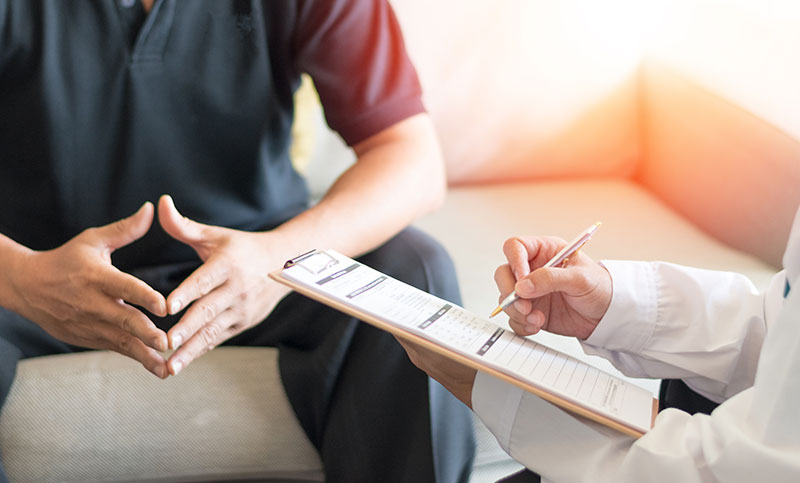
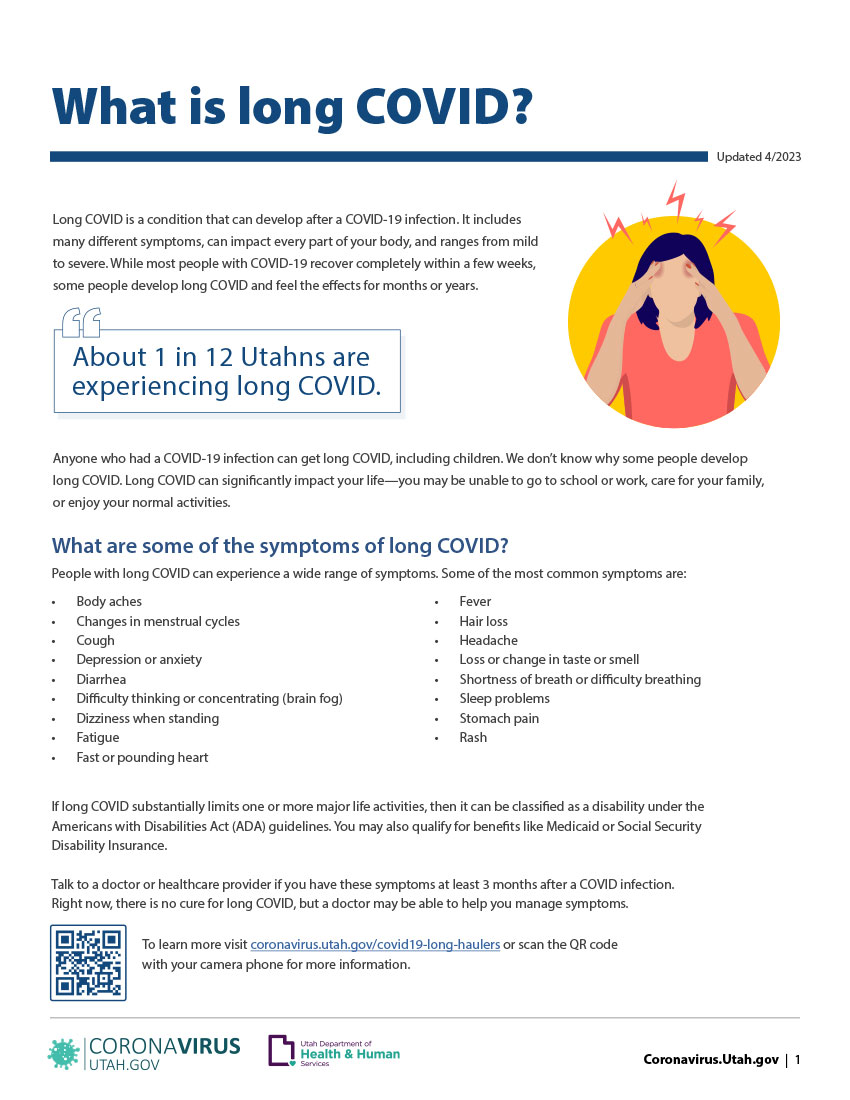
What is Long COVID?
Download PDF:
English / Arabic / Bosnian / Bhutanese / Burmese / Chinese (Simplified / Traditional) / Dari / French / Karen / Kinyarwanda / Kirundi / Korean / Lingala / Marshallese / Nepali / Pashto / Persian-Farsi / Portuguese / Rohingya / Russian / Samoan / Sango / Spanish / Somali / Swahili / Tagalog / Thai / Tigrinya / Tongan / Vietnamese
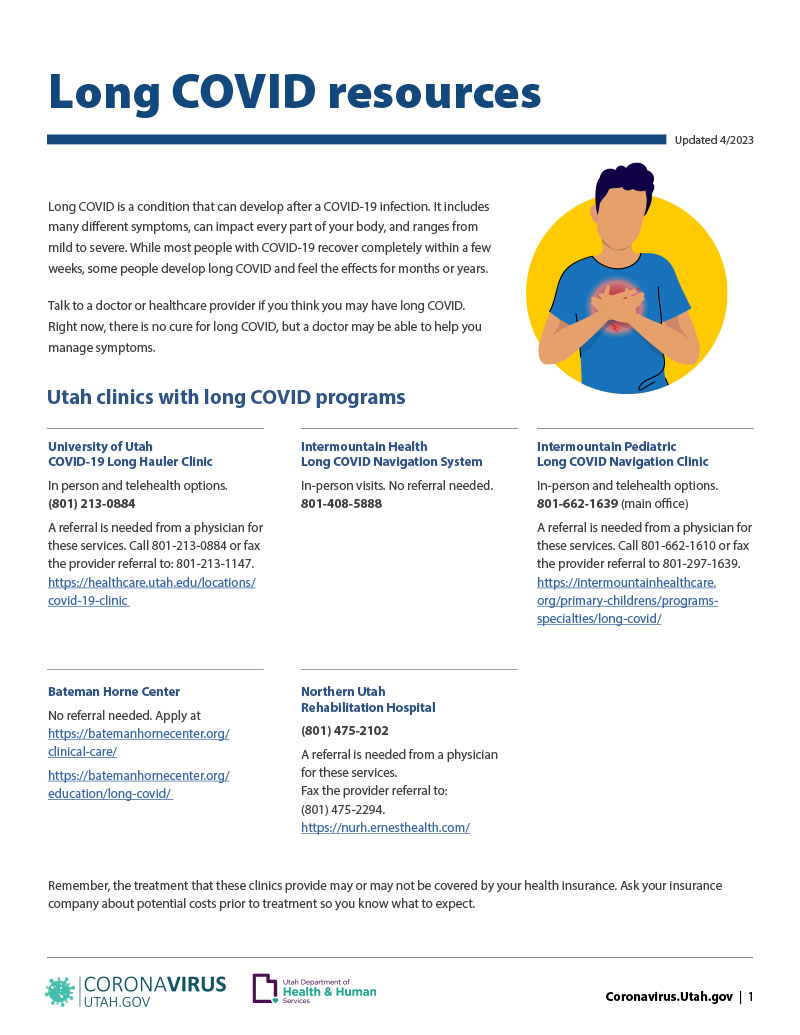
Long COVID resources
Download PDF:
English / Arabic / Bosnian / Bhutanese / Burmese / Chinese (Simplified / Traditional) / Dari / French / Karen / Kinyarwanda / Kirundi / Korean / Lingala / Marshallese / Nepali / Pashto / Persian-Farsi / Portuguese / Rohingya / Russian / Samoan / Sango / Spanish / Somali / Swahili / Tagalog / Thai / Tigrinya / Tongan / Vietnamese
Resources
- https://pubmed.ncbi.nlm.nih.gov/34951953/
- https://www.cdc.gov/coronavirus/2019-ncov/long-term-effects/index.html
- https://www.thelancet.com/journals/eclinm/article/PIIS2589-5370(21)00299-6/fulltext
- https://pubmed.ncbi.nlm.nih.gov/34643720/
- https://www.ncbi.nlm.nih.gov/pmc/articles/PMC7392393/
- https://www.cdc.gov/mmwr/volumes/70/wr/mm7037a2.htm?s_cid=mm7037a2_w#contribAff
- https://www.thelancet.com/journals/laninf/article/PIIS1473-3099(21)00460-6/fulltext?c#seccestitle10



